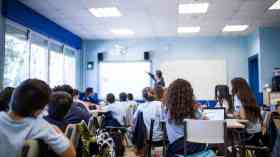Helping schools become the heart of community sports provision
Opening school sports facilities to the community can deliver health benefits locally – while creating a valuable source of income. Sport England discusses how its new ‘Use Our School’ digital tool can help schools lease their facilities.
Nearly 40 per cent of sporting facilities in England are on school sites, and currently 62 per cent of schools open these facilities to their local community. Sport England recognised that many more wanted to explore this type of provision and launched a comprehensive new online resource ‘Use Our School’ in June 2015.
The digital tool, developed in partnership with 40 schools and industry experts, aims to support schools in providing sports access as well as improve and sustain their current community programmes.
Schools across England are now reaping the rewards of leasing their sports facilities out of hours. They are playing a vital role in the provision of sport in their local communities, providing volunteering and vocational opportunities to their students, enjoying increased local status, and many are generating additional income.
What is the resource?
Use Our School is an online provision of advice and guidance on how to make the case for community use, operating safely, legal issues, managing finances and enterprising ideas. There is a bank of free tools and templates to download and adapt for purpose, as well as videos and case studies available from schools sharing their practice.
The website is a valuable source of information for head teachers, governors, business managers, sports centre managers and anyone responsible for managing community activity on school sites.
Case studies, including those shown in this article, show that regardless of the type of school, there is important information available whether you are looking to make improvements to your current community offer or you are after advice to start up.
Why has Sport England developed it?
Sport England is a public body, working to increase the number of people who play sport regularly with the aim of making their lives better through sport and keeping active. The organisation is focused on helping people and communities across the country create a sporting habit for life.
Jayne Molyneux, Sport England’s Strategic Lead for Youth, said: “We know what an important role schools play in their local community and we want to actively support those schools who already open up their facilities for community use, and those who are considering doing so.”
Detailed organisation and management goes into opening school facilities out of hours, so Sport England felt it would be useful to put together an online toolkit to allow schools to access all the information and advice they may need in one place. Alongside schools, industry experts were commissioned to write advice, for example, Price Waterhouse Cooper wrote the VAT Guidance and the Child Protection in Sport Unit of the NSPCC designed the safeguarding check and challenge tool.
With nearly two thirds of schools across England already offering their facilities for community use, it is obvious that the access is a win-win for both the community club or sport and the individual school. Sport England’s aim is to facilitate and support the development of this provision. Three quarters of sports halls and artificial sports pitches and a third of swimming pools in England are located in schools, enjoyed by children during term time but left dormant during the holidays or in the evening. Facilities are being underused and schools undervalued.
In-house management
Cardinal Heenan Catholic High School has a strong identity in the local community, successfully built up over many years. When the Sports Hall and Fitness Suite were built, the school engaged the Local Authority Leisure Services to manage the facilities during community hours. The school subsequently became a Specialist Sports College and a Community Sport Development Manager was appointed to promote use, specifically targeting sports clubs.
A successful Lottery bid enabled Cardinal Heenan to build four new artificial turf pitches, and the school was also allocated capital funding which was used to improve their tennis offer by investing in a full size 3G pitch. In 2013, in a mutual arrangement with Leisure Services, the school took over the community use management. This process was driven by the head teacher and community manager, supported by the governors. Two years on and the school is already seeing financial rewards and additional benefits.
Sport and more
Cowplain Community School (CCS) has historically hosted a strong adult learning programme which was delivered on site by South Downs College. Due to government funding cuts, the service was gradually reduced and the school began to look for an alternative delivery mechanism.
In 2005, CCS became a Business and Community Specialist College and transformed an old Caretaker’s house into a Business & Conference Centre. The Business and Community team have developed the family and adult learning courses and community links. Over the last 5 years, the school has increased the number of community programmes offered and developed relationships with a range of clubs and organisations, seeing their community income grow from £24,800 in 2006/7 to £82,200 in 2011/12.
The school converted to an Academy in 2012, and community use continues to be an important part of the school’s vision. They are also striving to be recognised as a key sport and leisure provider in the area and to become integral to Havant Borough Council’s Leisure Strategy.
Supporting the community
King Edward’s School is situated close to Birmingham University on a large site of 50 acres, which it shares with King Edward’s High School for Girls. It serves an extensive catchment of over 300 different schools across Birmingham and the West Midlands. The school has a strong tradition of community use and has provided community lettings for over 20 years. Three and a half years ago, King Edward’s created a new Director of Outreach role to enhance the community lettings with a targeted programme aimed at local primary schools.
King Edward’s chief master John Claughton is a former pupil of King Edward’s School, who played professional cricket for Warwickshire and has a keen understanding of the importance of community sport. His vision is for King Edward’s School to be at the heart of Birmingham’s education and sporting community, with a particular focus on breaking down barriers.
The school has extensive facilities including the Eastern Road playing fields, which are situated across a busy main road. The school only use these facilities during afternoons, so it has been developing programmes to encourage local groups (particularly local primary schools) to make use of the pitches when they are not required by the school. This includes a programme they have recently piloted, offering local primary schools (juniors) a free, five-week skills programme. The sports on offer include rugby, hockey and netball, and are delivered by skilled coaches and talented sports people who are already working with the school (several PE staff have played at international or professional level at hockey and rugby).
Last year, the coaches included Emily Scarratt, who was a key player in the England team that won the 2014 Women’s Rugby World Cup final against Canada. The primary school children participating in the programme not only develop confidence in the sport, but also meet a local community club and are encouraged to engage in that sport on a regular basis at a recreational level.
If you are interested in finding out more, Sport England is promoting Use Our School at national conferences and also offering some regional workshops where there is demand.
Further Information
www.sportengland.org/useourschool
Latest News
14/11/2025 - 11:04
England’s councils are warning of a "ticking time bomb" in the special educational needs and disabilities (SEND) system, with new data showing deficits that could bankrupt local authorities within three years.
13/11/2025 - 12:14
Event for school leaders, governors and education professionals relocates to the historic Old Billingsgate venue in London.
13/11/2025 - 09:49
The regulations have been set following a second consultation and detailed collaborative working with organisations and people across deaf and hearing communities.
13/11/2025 - 09:39
The Education Committee has published a letter to the Secretary of State for Education asking for more detail about the Department for Education’s work on developing its SEND reforms.
13/11/2025 - 09:26
New analysis by NFER has highlighted the uneven distribution of pupils with special educational needs and disabilities (SEND) across mainstream schools in England.







